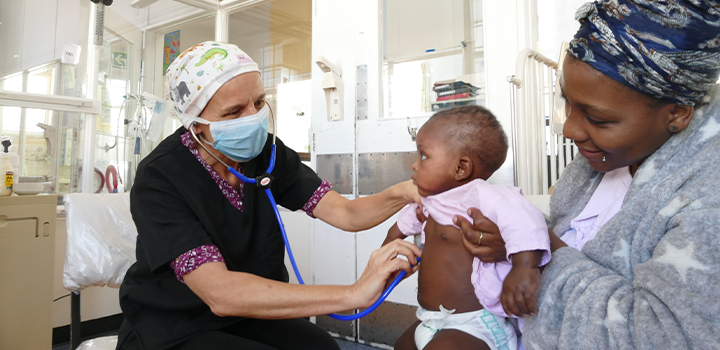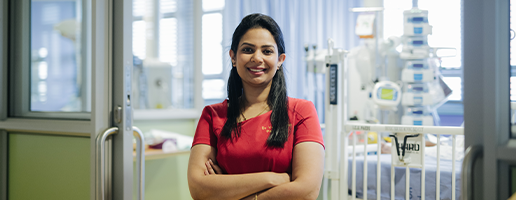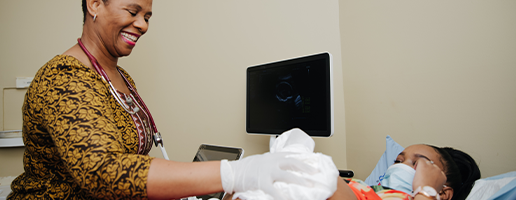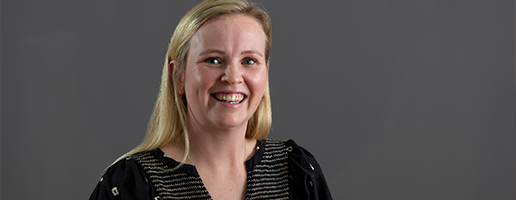Bringing hope to children with epilepsy in the Eastern Cape

A youth exchange programme to a rural hospital in Liberia in 1987 inspired German-born Dr Isabel Michaelis to study medicine. Today, she is a paediatric neurologist who shares her expertise with patients and colleagues at Frere Hospital in East London.
This Women's Month, we pay tribute to Dr Isabel Michaelis. Like many other paediatricians, she knew early on that caring for children was what she wanted to do with her life.
"During my studies, I enjoyed paediatrics the most. I worked in both paediatric surgery and paediatric orthopaedics, but I was fascinated by the neurology and the neurodevelopmental part of this field," Dr Michaelis says.
Her father was a professor in neurodevelopmental medicine at a German university. One of her mentors is a recently retired paediatrician and world-renowned TB researcher, Prof Nulda Beyers, who worked with her at Tygerberg Hospital. Before she retired, Prof Beyers was a senior specialist and professor in the Department of Paediatrics and Child Health at Stellenbosch University.
A paediatrician deals with two patients
"What makes paediatrics challenging is that you are dealing with two patients: the child and the parent. It is an interdisciplinary field, as looking at the lifestyle of the whole family is crucial in treating many childhood diseases," she explains.
Dr Michaelis has received a Discovery Foundation Award to study the epidemiology of epilepsies in children at Frere and Cecilia Makiwane Hospitals in East London.
Born in Germany into a family of doctors, she did her medical training in Germany and France. While studying, she met her husband, Abraham Olivier, a South African who was doing his PhD in philosophy at the same university. They moved to South Africa permanently in 2007.
In 2009, she started working at Frere Hospital in East London. She realised that epilepsy and neurodevelopmental delay were common in that region.
"Epilepsy is still considered a curse by some"
"In my research, I also realised that the children were not always treated adequately for these neurological conditions, as it was still sometimes considered a curse in the community and one that should be treated with traditional medicine," Dr Michaelis says.
"There is also a lack of expertise in many healthcare facilities in the province when it comes to treating epilepsy and seizures in children. As both of these can be difficult to distinguish from other non-epileptic episodes, it is sometimes difficult for healthcare workers to make the right diagnosis," she adds.
She says there is a great need for more research and education about epilepsy in children, especially in the Eastern Cape, where the incidence of epilepsy is higher than in many other parts of the world.
What puzzles her even more is that there does not seem to be a genetic component to this. She explains that there is very limited antenatal and perinatal care, especially in the rural areas. So, when complications arise, the necessary medical expertise is not always at hand.
"This contributes to the high incidence of neurological problems, such as epilepsy. The prevalence of infectious and parasitic conditions is also a factor, as is head traumas," she adds.
Epilepsy research and teaching crucial in Eastern Cape
Dr Michaelis speaks highly of the Paediatric Epilepsy Training course, originally an initiative of the British Paediatric Neurology Association. It is a one-day course aimed at improving practice when dealing with childhood epilepsies and is suitable for all health professionals who provide primary or secondary level care for children with epilepsy. But the training is not always possible.
"Frere Hospital is a well-equipped hospital with very competent staff, but this area of paediatrics has few specially trained allied health workers to really make a difference to the lives of children living with these conditions," she concludes. "That has the potential to be very disabling."
This article was created for the 2020 Discovery Foundation Awards and has been edited for the Discovery Magazine.
About the Discovery Foundation
Since 2006, the Discovery Foundation has invested over R256 million in grants to support academic medicine through research, development and training medical specialists in South Africa.
The Discovery Foundation is an independent trust with a clear focus - to strengthen the healthcare system - by making sure that more people have access to specialised healthcare services. Each year, the Discovery Foundation gives five different awards to outstanding individual and institutional awardees in the public healthcare sector.
Related articles

Dr Veena John awarded for her research on HIV in infants
This Women's Month, we say thank you to Dr Veena John, a Discovery Foundation Award recipient whose decision to become a paediatrician is now improving the lives of children in communities in the Eastern Cape, her home province.

An obstetrician and a lawyer? That's Dr Faith Ngambu
This Women's Month, we pay tribute to Dr Faith Ngambu, an obstetrician and gynaecologist sub-specialising in maternal foetal medicine. She received a Discovery Foundation Award in 2020 to pursue this much-needed specialisation.

Tackling post-traumatic stress disorder in ICU patients
Being in an intensive care unit and receiving critical care can be a harrowing experience. Psychiatry registrar Dr Sarah Boshoff is investigating how doctors and nurses can help to prevent triggers of post-traumatic stress disorder in patients.